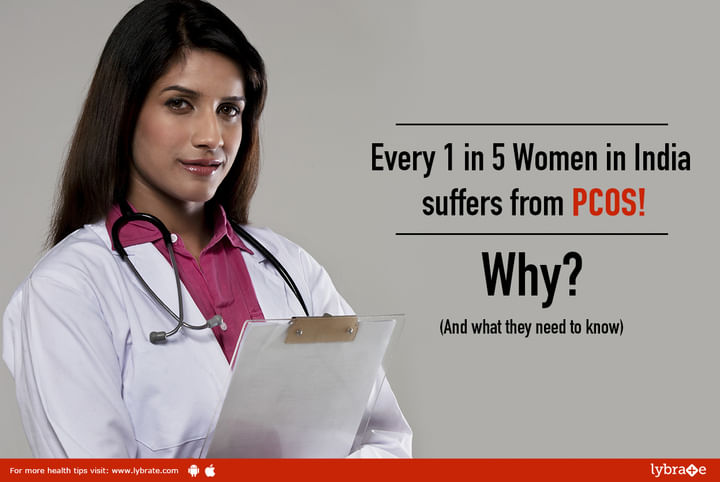Get the App
For Doctors
Login/Sign-up
Last Updated: Jan 10, 2023
BookMark
Report
Every 1 in 5 Women in India suffers from PCOS! Why? (And what they need to know)
Why every 1 in 5 Women in India suffers from PCOS? (And what they need to know)
Polycystic ovarian syndrome (PCOS) is a medical condition related to a woman’s endocrine system. Generally, this disorder is characterised by an imbalance of the sex hormones (oestrogen and progesterone), which leads to the development of multiple small cysts in the ovaries. Symptoms of PCOS include acne, irregular menstrual cycle and depression to name a few.
The causes of PCOS have not been accurately identified so far, but researchers suggest that the following factors might contribute to the onset of the condition.
1. Increased amount of insulin secretion- Women suffering from insulin resistance may get PCOS as their body is not able to effectively use this insulin, which results in increased insulin secretion by the pancreas. This, in turn, triggers more androgen (male sex hormone) production in the ovaries, making it difficult for the ovaries to ovulate.
2. Lower inflammation levels- The white blood cells present in your body form resistance against infections through a response termed as inflammation. Women with lower inflammation levels are likelier to get PCOS as the decreased levels stimulate polycystic ovaries, thereby producing more androgens.
3. Genetic factor- If you have a family history of PCOS, it’s highly probable that you may also get it as the disease is linked with your genes.
How To Live with PCOS
PCOS comes with numerous side effects like acne, obesity, infertility, excessive facial or body hair among others. There are certain lifestyle changes, which you may consider to manage PCOS and minimise its side effects.
1. Change your diet - Opt for a low carbohydrate, low sugar diet to keep your insulin levels in control, as insulin is responsible for increasing the severity of PCOS symptoms.
2. Try to maintain an ideal body weight - Obesity is known for worsening insulin resistance, and you can prevent this by regularly keeping your weight in check. You can practice some easy at-home exercise to reduce weight besides having a balanced diet.
3. Get yourself checked regularly - Visit a doctor and get yourself checked regularly for potential health risks as PCOS is often associated with increased chances of diabetes, heart diseases, certain forms of cancer, hypertension, and high LDL (bad) cholesterol levels.
4. Join a support group - Joining a PCOS support group will help you cope with your emotional difficulties, while helping you to live a better life by cultivating an optimistic outlook.
If you would like to consult with me privately, please click on 'Consult'.
Polycystic ovarian syndrome (PCOS) is a medical condition related to a woman’s endocrine system. Generally, this disorder is characterised by an imbalance of the sex hormones (oestrogen and progesterone), which leads to the development of multiple small cysts in the ovaries. Symptoms of PCOS include acne, irregular menstrual cycle and depression to name a few.
The causes of PCOS have not been accurately identified so far, but researchers suggest that the following factors might contribute to the onset of the condition.
1. Increased amount of insulin secretion- Women suffering from insulin resistance may get PCOS as their body is not able to effectively use this insulin, which results in increased insulin secretion by the pancreas. This, in turn, triggers more androgen (male sex hormone) production in the ovaries, making it difficult for the ovaries to ovulate.
2. Lower inflammation levels- The white blood cells present in your body form resistance against infections through a response termed as inflammation. Women with lower inflammation levels are likelier to get PCOS as the decreased levels stimulate polycystic ovaries, thereby producing more androgens.
3. Genetic factor- If you have a family history of PCOS, it’s highly probable that you may also get it as the disease is linked with your genes.
How To Live with PCOS
PCOS comes with numerous side effects like acne, obesity, infertility, excessive facial or body hair among others. There are certain lifestyle changes, which you may consider to manage PCOS and minimise its side effects.
1. Change your diet - Opt for a low carbohydrate, low sugar diet to keep your insulin levels in control, as insulin is responsible for increasing the severity of PCOS symptoms.
2. Try to maintain an ideal body weight - Obesity is known for worsening insulin resistance, and you can prevent this by regularly keeping your weight in check. You can practice some easy at-home exercise to reduce weight besides having a balanced diet.
3. Get yourself checked regularly - Visit a doctor and get yourself checked regularly for potential health risks as PCOS is often associated with increased chances of diabetes, heart diseases, certain forms of cancer, hypertension, and high LDL (bad) cholesterol levels.
4. Join a support group - Joining a PCOS support group will help you cope with your emotional difficulties, while helping you to live a better life by cultivating an optimistic outlook.
If you would like to consult with me privately, please click on 'Consult'.



+1.svg)
